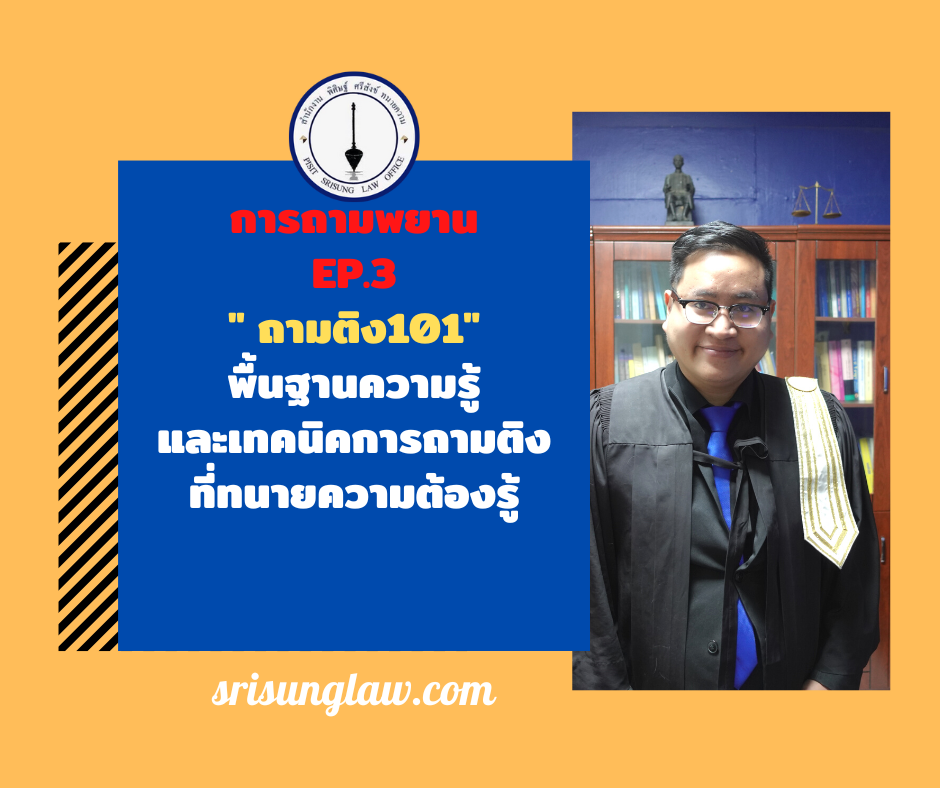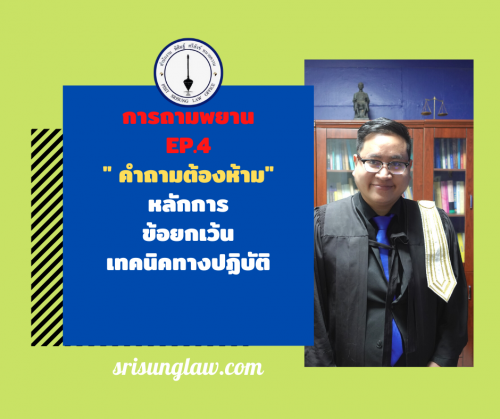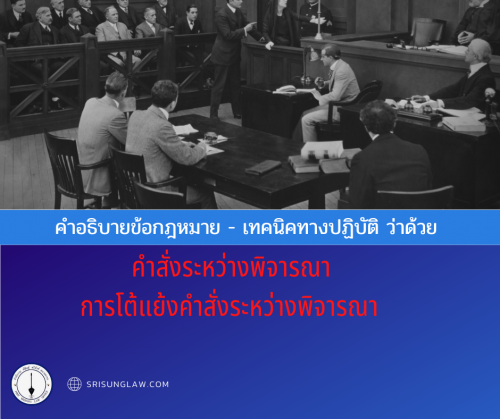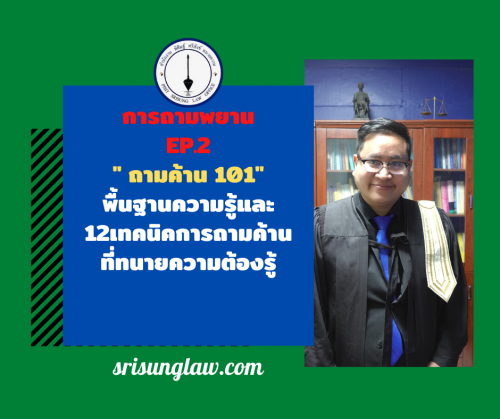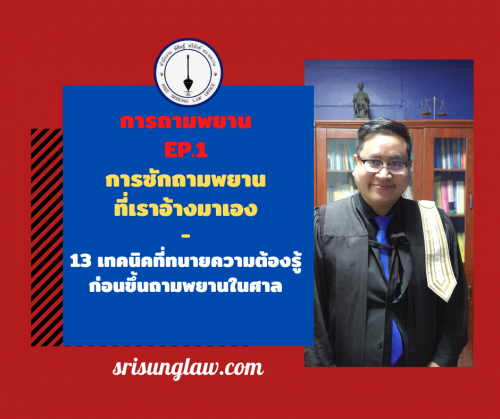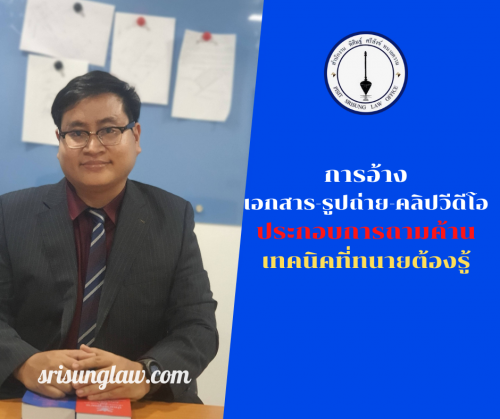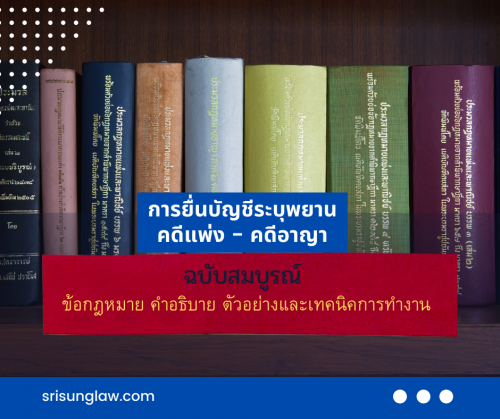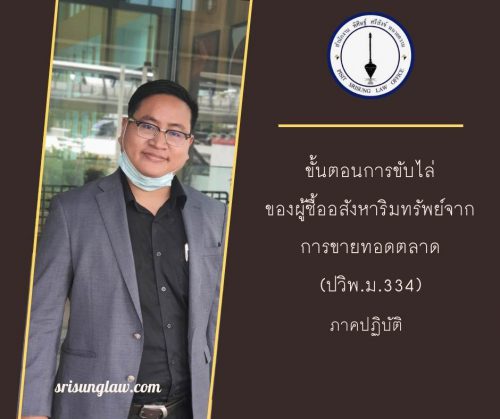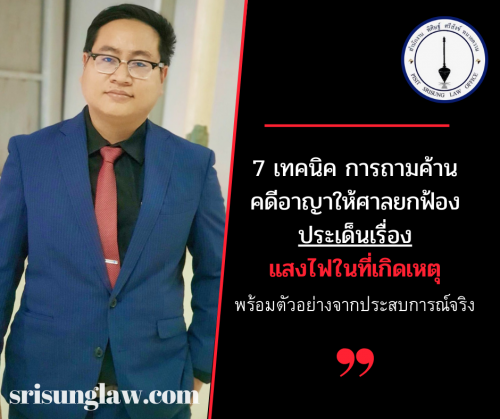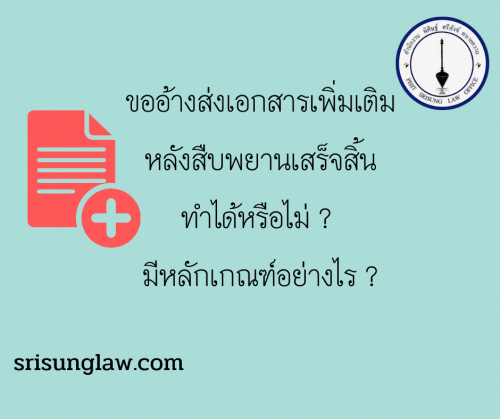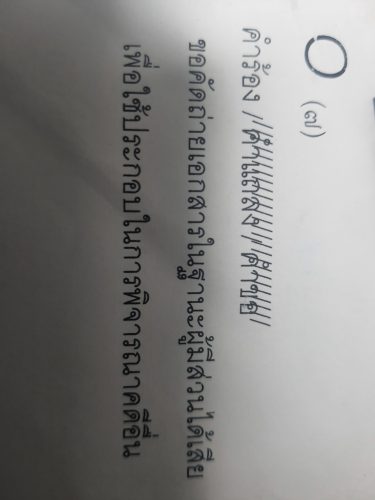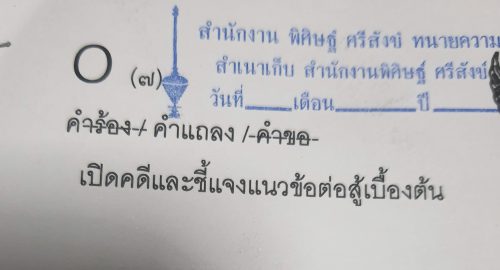การถามติง เป็นอีกหนึ่งงานในหน้าที่ของทนายความที่ว่าความในชั้นศาลที่จะต้องปฏิบัติอยู่ในแทบทุกคดี
แต่อย่างไรก็ตามในการเรียนการสอนไม่ว่าจะเป็นในชั้นปริญญาตรี เนติบัณฑิต หรือสภาทนายความเอง ก็มักไม่ค่อยมีการเรียนการสอนวิธีการถามติงอย่างถูกต้องและเป็นประโยชน์ในทางปฏิบัติมากเท่าไหร่เน้นไปในการเรียนเพื่อใช้ในการสอบเสียมากกว่า
วันนี้ผมจึงจะมาอธิบายเรื่องการถามติง โดยเน้นเป็นเรื่องทฤษฎี รวมทั้งเทคนิคทางปฏิบัติ เพื่อให้ใช้เป็นคู่มือประกอบการทำงานของเพื่อนๆทนายความครับ
การถามติงคืออะไร ?
การอธิบายว่า การถามติง คืออะไรนั้น ต้องเข้าใจระบบการถามพยานในศาลเสียก่อน ซึ่งสามารถอธิบายได้ดังนี้
ข้อกฎหมาย
ประมวลกฎหมายวิธีพิจารณาความแพ่งมาตรา ๑๑๗
คู่ความฝ่ายที่อ้างพยานชอบที่จะตั้งข้อซักถามพยานได้ในทันใดที่พยานได้สาบานตนและแสดงตนตามมาตรา ๑๑๒ และ ๑๑๖ แล้ว หรือถ้าศาลเป็นผู้ซักถามพยานก่อน ก็ให้คู่ความซักถามได้ต่อเมื่อศาลได้ซักถามเสร็จแล้ว
เมื่อคู่ความฝ่ายที่ต้องอ้างพยานได้ซักถามพยานเสร็จแล้ว คู่ความอีกฝ่ายหนึ่งชอบที่จะถามค้านพยานนั้นได้
เมื่อได้ถามค้านพยานเสร็จแล้ว คู่ความฝ่ายที่อ้างพยานชอบที่จะถามติงได้
คำอธิบาย
ธรรมดาแล้วในการถามพยานจะแบ่งขั้นตอนการถามออกเป็น 3 ขั้นตอนด้วยกันคือ
1.ซักถาม
คือการถามที่ทนายความฝั่งที่อ้างพยานมานั้นจะเอาพยานของตนเอง ขึ้นเบิกความต่อศาลและซักถามพยานของฝ่ายตัวเองเพื่อให้พยานเบิกความข้อเท็จจริงตามที่ตนเองต้องการ เพื่อสนับสนุนรูปคดีของตนเอง การหารแบบนี้คือการ ซักถามพยาน
การถามพยาน ตอนที่ 1 ” ซักถามพยาน ” – รวม 13 เคล็ดลับที่ทนายความต้องรู้ก่อนขึ้นถามพยานในชั้นศาล
2.ถามค้าน
คือภายหลังจากที่ทนายความฝั่งที่อ้างพยานมาซักถามจบ ทนายความฝั่งที่อยู่ฝ่ายตรงข้าม จะมีสิทธิ์ถามพยานคนดังกล่าวได้ ซึ่งเรียกว่าการถามค้าน โดยมีวัตถุประสงค์เพื่อทำลายน้ำหนักความน่าเชื่อถือของพยานฝ่ายตรงข้าม หรือเพื่อให้พยานฝ่ายตรงข้ามเบิกความให้เป็นประโยชน์กับรูปคดีของตน
” ถามค้าน 101 ” – รวมพื้นฐาน 12 เทคนิคการถามค้าน ที่ทนายความต้องรู้ก่อนขึ้นว่าความ
3.ถามติง
คือภายหลังจากที่พยานเบิกความตอบคำถามค้านของฝ่ายตรงข้ามแล้ว ทนายความฝั่งที่อ้างพยานมีสิทธิ์ลุกขึ้นมาถามได้อีกรอบเรียกว่าถามติงโดยมีวัตถุประสงค์เพื่อ ให้พยานเบิกความอธิบายถึงเรื่องที่ตอบคำถามค้านทนายความฝั่งตรงข้ามไป แล้วเกิดความเสียหายกับรูปคดีหรือยังไม่ชัดเจน
วัตถุประสงค์ของการถามติง
ธรรมดาแล้วเมื่อเราเป็นทนายความและอ้างพยานเบิกความต่อต่อศาล เมื่อตอนที่เบิกความตอบคำถามของเราไม่ใช่เรื่องยาก เพราะเราสามารถซักซ้อมหรือทำความเข้าใจกันได้อยู่แล้ว
แต่เวลาที่พยานเบิกความตอบคำถามทนายความฝั่งตรงข้าม หรือการตอบคำถามค้านนั้น พยานเองก็อาจจะเบิกความผิดพลาดคลาดเคลื่อนไปจากความเป็นจริง เบิกความไม่กระจ่างชัดเจน เบิกความคลุมเครือตีความได้หลายทาง หรือเบิกความในลักษณะที่อาจจะเกิดความเสียหายกับรูปคดีของเรา
ทั้งนี้อาจจะเกิดได้หลายสาเหตุ เช่นพยานสับสนกับคำถามของทนายความฝั่งตรงข้าม พยานเข้าใจคำถามไม่ถูกต้อง ตกใจหรือประมาททำให้ตอบผิดพลาดไป คล้อยตอบตามคำถามนำของฝ่ายตรงข้ามไปโดยไม่คิด รีบตอบเกินไป หรือไม่เข้าใจวิธีการตอบคำถามที่ถูกต้อง ฯลฯ
ดังนั้นกฎหมายจึงให้โอกาสทนายความฝั่งที่อ้างพยาน ลุกขึ้นถามพยานได้อีกรอบนึง เรียกว่าการถามติง เพื่อให้พยานเบิกความอธิบายในเรื่องที่ตอบคำถามค้านทนายความฝั่งตรงข้ามไป เพื่อให้เกิดความถูกต้องหรือชัดเจนขึ้น
ดังนั้นวัตถุประสงค์ของการถามติงจึงมีดังนี้
1.ให้พยานเบิกความอธิบายว่า สาเหตุที่ตอบคำถามค้านผิดพลาดไปจากความเป็นจริงเป็นเพราะอะไร
2.ให้พยานเบิกความอธิบาย ถึง คำถามที่ตอบไปแล้วยังไม่ชัดเจน คลุมเครือหรือตีความได้หลายทาง หรือยังไม่สิ้นกระแสความ
ข้อห้ามในการถามติง
ในการถามติงนั้น ไม่ใช่ว่าทนายความอยากจะถามคำถามไหนก็ได้ แต่มีข้อห้ามที่สำคัญอยู่ 2 ประการก็คือ
ข้อกฎหมาย
ประมวลกฎหมายวิธีพิจารณาความแพ่ง มาตรา ๑๑๘
ในการที่คู่ความฝ่ายที่อ้างพยานจะซักถามพยานก็ดี หรือถามติงพยานก็ดี ห้ามมิให้คู่ความฝ่ายนั้นใช้คำถามนำ เว้นแต่คู่ความอีกฝ่ายหนึ่งยินยอมหรือได้รับอนุญาตจากศาล
ในการที่คู่ความฝ่ายที่อ้างพยานจะถามติงพยาน ห้ามมิให้คู่ความฝ่ายนั้นใช้คำถามอื่นใดนอกจากคำถามที่เกี่ยวกับคำพยานเบิกความตอบคำถามค้าน
คำอธิบาย
ห้ามใช้คำถามนำ
คำถามนำ หมายถึงคำถามที่แนะนำคำตอบให้พยานทราบอยู่ในตัว เช่น คำถามว่า
- ใช่หรือไม่ใช่
- ใช่ไหมครับ
- ถูกต้องไหมครับ
- เป็นแบบนี้นะครับ
- ซ้ายหรือขวา
- ขาวหรือดำ
ฯลฯ
หรือพูดง่ายๆเป็นคำถามที่พยายามแค่พยักหน้าหรือตอบว่าใช่อย่างเดียวก็ได้แล้ว
ทั้งนี้เพราะหากปล่อยให้ทนายความถามนำพยานได้ ก็เท่ากับว่าพยานไม่ต้องตอบอะไรเลย เพียงแค่ตอบตามที่ทนายความฝั่งของตนเองถามนำก็เพียงพอแล้ว ซึ่งจะทำให้ฝ่ายตรงข้ามเสียเปรียบเป็นอย่างยิ่ง
ดังนั้นจำไว้ว่าในการถามติง จึงห้ามใช้คำถามนำ เว้นแต่จะได้รับความยินยอมจากอีกฝ่ายหนึ่งหรือได้รับอนุญาตจากศาล
หากเราถามติงโดยใช้คำถามนำ ศาลที่เคร่งครัดก็จะไม่บันทึกคำตอบของพยานให้ หรือเมื่อเจอฝ่ายตรงข้ามโต้แย้งคัดค้านศาลก็จะไม่บันทึกคำตอบให้เช่นเดียวกัน
ถามได้เฉพาะเรื่องที่พยานตอบคำถามค้าน
เนื่องจากวัตถุประสงค์ของการถามติง ก็เพื่อให้พยานเบิกความอธิบายในเรื่องที่ตอบคำถามค้านผิดพลาดหรือยังไม่ชัดเจนอย่างที่ผมอธิบายตั้งแต่ต้นอยู่แล้ว
ดังนั้นสิทธิ์ในการถามติง จึงมีสิทธิ์ถามได้เฉพาะเรื่องที่พยานเบิกความตอบคำถามค้านไปเท่านั้น ไม่มีสิทธิ์ถามในเรื่องอื่นที่ไม่เกี่ยวข้องกับสิ่งที่พยานเบิกความตอบคำถามค้าน หรือถามเพื่อให้พยานเบิกความอธิบายในเรื่องใหม่
หากกฎหมายปล่อยให้เราถามพยานติงพยานในเรื่องอื่นที่ไม่ใช่เรื่องที่ตอบคำถามค้านได้ ก็เท่ากับให้สิทธิ์เราในการถามพยานเรื่องใหม่ไปเรื่อยๆ ซึ่งจะทำให้ฝ่ายตรงข้ามเสียเปรียบเพราะไม่มีโอกาสถามค้านอีกรอบนึง
เคล็ดลับและวิธีการถามติง
1.คอยฟังและจดบันทึกขณะพยานของเราตอบคำถามค้าน
ในขณะที่พยานของเราเบิกความตอบคำถามค้านของทนายความฝั่งตรงข้ามอยู่นั้น เราจะต้องคอยฟังอยู่ตลอดและคอยจดว่าพยานของตอบเราตอบคำถามอะไรไปบ้าง
หากพยานของเราเบิกความตอบคำถามค้านผิดไปจากความเป็นจริง คลาดเคลื่อนไปจากข้อเท็จจริงที่อยู่ในสำนวน หรือตอบไม่ชัดเจนกำกวมตีความได้หลายทาง เราจะต้องจดบันทึกไว้เลยว่าพยานตอบคำถามแบบนั้นไป
หลังจากนั้นเมื่อจบคำถามค้านแล้วให้เราขึ้นถามติงพยาน โดยพยายามให้พยานอธิบายในเรื่องที่ตนเองต่อผิดพลาดไปดังนี้
- ให้พยานอธิบายว่า ที่ตอบคำถามค้านแบบนั้นไป เข้าใจคำถามว่าอย่างไร
- ให้พยานอธิบายว่า เหตุผลที่ตอบคำถามค้านแบบนั้น เป็นเพราะอะไร ทำไม
- ให้พยานอธิบายถึงคำตอบที่ยังอาจกำกวมหรือไม่ชัดเจน ตีความได้หลายทาง ยังไม่สิ้นกระแสความ
อย่างไรหากพยานตอบดีหรือชัดเจนอยู่แล้ว ไม่ได้ก่อให้เกิดความเสียหายหรือกระทบกับรูปคดีเราก็ไม่จำเป็นต้องถามติงเสมอไป
2.เริ่มคำถามจากการทวนคำตอบ
ธรรมดาแล้วในการถามติง เรามักจะเริ่มจากการทวนคำตอบของพยานที่ตอบคำถามค้านทนายความฝั่งตรงข้าม เพื่อให้พยานนึกคิดได้ว่า สิ่งที่ตอบไปนั้นไม่ถูกต้องตรงไหน
การตั้งคำถามติง โดยอ้างอิงจากการตอบคำถามยังเป็นการป้องกันปัญหาที่ฝ่ายตรงข้ามจะคัดค้านว่า คำถามติงนั้นไม่เกี่ยวข้องกับคำถามค้านได้เป็นอย่างดีด้วย
ตัวอย่างการตั้งคำถาม
ตัวอย่างแรก
ในคดีฆาตกรรม พยานโจทก์เบิกความตอบคำถามค้านทนายความจำเลยว่า “ วันเกิดเหตุแสงไฟในที่เกิดเหตุมืดมาก พยานไม่เห็นจำเลยในขณะเกิดเหตุ “ ซึ่งทำให้มีข้อสงสัยว่าพยานโจทก์ปากนี้เห็นจำเลยในวันเกิดเหตุหรือไม่
ทนายความโจทก์อาจตั้งคำถามติงเช่นนี้
พยานครับที่พยานเบิกความตอบท่านทนายความจำเลยถามค้านไปว่า “ วันเกิดเหตุแสงไฟในที่เกิดเหตุมืดมาก พยานไม่เห็นจำเลยในขณะเกิดเหตุ “ แล้วเหตุใดพยานจึงยืนยันว่าจำเลยเป็นคนกระทำความผิดครับ
พยานอาจจะตอบว่า “ในขณะเกิดเหตุผมไม่เห็นจำเลย แต่หลังจากเหตุการณ์เสร็จสิ้นแล้ว จำเลยวิ่งออกจากที่เกิดเหตุวิ่งสวนกับผมไป เห็นจำเลยถืออาวุธปืนจึงมั่นใจว่าจำเลยเป็นผู้ก่อเหตุ “
ซึ่งคำตอบนี้จะทำให้ความเสียหายที่เกิดขึ้นจากการที่พยานตอบคำถามค้านหายไป
ตัวอย่างที่สอง
ในคดีฆาตกรรม พยานจำเลยซึ่งเป็นพยานยืนยันฐานที่อยู่ของจำเลย เบิกความตอบอัยการโจทก์ถามค้านไปว่า “วันเกิดเหตุจำเลยไม่ได้ว่าพยานอยู่กับจำเลยหรือไม่ “ ซึ่งทำให้น้ำหนักความน่าเชื่อถือของพยานปากนี้ลดลง
ทนายความจำเลยอางจะตั้งคำถามติงเช่นนี้
ที่พยานเบิกความตอบท่านอัยการโจทก์ ถามค้านไปว่า “ พยานจำไม่ได้ว่า จำเลยอยู่กับพยานหรือไม่ “ พยานเข้าใจคำถามว่าอย่างไรครับ
พยานอาจจะตอบว่า “ ผมจำไม่ได้ว่าเขาอยู่กับผมทั้งวันหรือไม่ เลยตอบไปแบบนั้น แต่ตอนบ่ายสอง เวลาเกิดเหตุเขานั่งเล่นเกมส์อยู่กับผมจนถึง 5 โมงเย็น”
คำตอบลักษณะนี้จะทำให้คำเบิกความของพยานชัดเจนขึ้นและความเสียหายที่เกิดขึ้นจากการตอบคำถามค้านก็จะหายไป
ตัวอย่างที่สาม คดีทางภารจำยอม ฝ่ายโจทก์ต่อสู้ว่าการใช้ทางพิพาทเป็นการใช้โดยวิสาสะในหมู่ญาติ จึงไม่ได้สิทธิภารจำยอม แต่ปรากฎว่าพยานโจทก์กลับตอบคำถามค้านทนายความจำเลยว่า “ใครจะเข้าออกทางพิพาทก็ได้” ซึ่งทำให้ตีความได้ว่า ผู้ใดก็เข้าออกทางพิพาทได้ เป็นการใช้อย่างปรปักษ์
ทนายความโจทก์ก็อาจจะถามติงว่า
ที่พยานเบิกความตอบทนายความโจทก์ถามค้านว่า “ใครจะเข้าออกทางพิพาทก็ได้” หมายความว่าอย่างไรครับ
พยานอาจจะตอบว่า “คำว่าใครที่ผมตอบไปนั้น หมายถึงญาติพี่น้องหรือคนสนิทที่รู้จักกันเท่านั้น ไม่ใช่หมายถึงคนทั่วไปที่ไม่รู้จักกัน”
คำตอบแบบนี้ก็ทำให้คำเบิกความของพยานที่ไม่ชัดเจนตีความได้หลายทางชัดเจนขึ้นและความเสียหายที่เกิดจากการตอบคำถามค้านก็ลดลงไป
3.พยายามใช้คำถามว่าทำไม
ธรรมดาแล้วเนื้อหาของการถามติง ก็คือให้พยานเบิกความอธิบายในเรื่องที่ตนเองเบิกความตอบคำถามค้านผิดพลาดหรือไม่ชัดเจน ดังนั้นจึงควรใช้คำถามว่า “ทำไม” ซึ่งเป็นคำถามปลายเปิดให้พยานอธิบาย
เช่น
- ทำไมพยานถึงเบิกความตอบคำถามเช่นนั้น
- ทำไมถึงได้ยืนยันว่าเห็นเหตุการณ์
- ทำไมจึงมั่นใจว่าจำเลยเป็นผู้กระทำความผิด
ฯลฯ
4.อย่าใช้อารมณ์หรือความโกรธหรือดูพยานที่เบิกความผิดไปจะยิ่งทำให้พยานเตลิด
ธรรมดาแล้ว เมื่อพยานเบิกความตอบคำถามค้านผิดพลาด คลาดเคลื่อนไปจากความเป็นจริง มันจะทำให้เราเกิดอาการอารมณ์เสียที่พยานเบิกความไม่ถูกต้อง ซึ่งเราต้องพยายามข่มอารมณ์โกรธไว้ และคุยกับพยานด้วยความใจเย็น
หากเรายิ่งแสดงอารมณ์โกรธหรือดูพยานที่ตอบผิดพลาดจะยิ่งทำให้พยานเตลิด แล้วเบิกความผิดพลาดยิ่งขึ้นไปอีกเราควรจะค่อยๆคุยกับพยานชี้ให้เห็นว่าพยานเบิกความผิดพลาดเพราะอะไรและพยานเบิกความแก้
สรุป
การถามติงเป็นหนึ่งในเบสิคพื้นฐานในการทำงานของทนายความที่จะต้องใช้อยู่ตลอดชีวิต ดังนั้นเราจึงควรทำความเข้าใจวิธีการถามติงที่ถูกต้อง ทั้งเรื่องวัตถุประสงค์ ข้อห้ามในการถาม วิธีการถาม และเทคนิคเคล็ดลับในทางปฏิบัติ
ซึ่งผมหวังว่า บทความเรื่องการถามติงนี้จะเป็นประโยชน์อย่างมากในการทำงานและการว่าความในชั้นศาล ของเพื่อนๆทนายความครับ

 51/29-51-30 หมู่ 4 ต.บ้านสวน อ.เมือง จ.ชลบุรี
51/29-51-30 หมู่ 4 ต.บ้านสวน อ.เมือง จ.ชลบุรี


